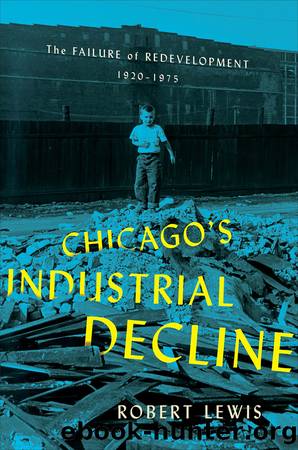Chicago's Industrial Decline by Robert Lewis

Author:Robert Lewis [Lewis, Robert]
Language: eng
Format: epub
Tags: History, United States, State & Local, Midwest (IA; IL; IN; KS; MI; MN; MO; ND; NE; OH; SD; WI), Political Science, Public Policy, City Planning & Urban Development, Business & Economics, Development, Economic Development
ISBN: 9781501752636
Google: jTXUDwAAQBAJ
Publisher: Cornell University Press
Published: 2020-12-15T01:11:17+00:00
The CECD and Industrial Property
In May 1961, Mayor Daley announced the creation of the CECD and the appointment of David M. Kennedy as the agencyâs chairman. In his announcement, Daley pointed out that Chicago was facing intense competition from other cities, and despite its stature as an industrial leader, the agencyâs task was to maintain existing economic activities as well as bring in new ones.10 As the committeeâs executive director noted in 1964, its policy was âto work primarily on retaining industry in Chicago.â11 Over the next ten years, even though the CECD worked to fight industrial decline in the city by creating plans for economic growth across Chicagoland, it focus remained on the retention of industry within the city.12
Daley had chosen wisely. The son of a Utah rancher and politician, Kennedy received a BA in 1928 and law degree from Georgetown in 1937. Between 1930 and 1946, he was employed at the Federal Reserve in Washington, DC, working his way up to become the assistant to Marriner Eccles, the bankâs chairman. He left the Reserve in 1946 for Chicago to work at the Continental Illinois National Bank, becoming president in 1951 and chairman in 1961. Between 1953 and 1954, he moved back to Washington to take a job as a special assistant to the secretary of the Treasury, Hubert Humphrey, to work on federal debt. He left Chicago, Continental, and the CECD in January 1969 to take over as President Richard Nixonâs secretary of the Treasury, a position he held until February 1971.13 Along with this background in financial and political matters, Kennedy brought another asset to the position: he was not an industrialist. As a banker, he had a deeply held interest in the financial aspect of property, industrial and otherwise, but, unlike the more moribund executives that populated the upper echelons of Chicagoâs industrial bourgeoisie, he was not chained to entrenched ways of thinking about industrial property and practices.
As befitting one of the countryâs leading bankers, Kennedy had very clear ideas about the governmentâs role in economic matters: keep it to a minimum. This was laid out in an opinion piece published in the Chicago Tribune three years before he became the head of the CECD.14 In reference to the United Statesâ troubled economy, he noted that âthis current adjustmentâ could âbe taken in stride without resorting to massive government programs,â as they would do little to solve the current troubles and would only create long-term problems. Ever a pragmatist, he changed his opinion over time. Not unsurprisingly, the attractions of various forms of government largesse were tantalizing, as he became more involved in the mundane business of working with industrialists, community organizations, and city officials to rebuild the city. The difficulties of attracting new industrial sectors, eliminating blight, and refashioning factory districts forced Kennedy to change his views.
This shift in his thinking was clearly laid out in one of his first speeches as CECD chair. After describing the challenges facing Chicago, Kennedy told his audience that
Download
This site does not store any files on its server. We only index and link to content provided by other sites. Please contact the content providers to delete copyright contents if any and email us, we'll remove relevant links or contents immediately.
The Vikings: Conquering England, France, and Ireland by Wernick Robert(79165)
Ali Pasha, Lion of Ioannina by Eugenia Russell & Eugenia Russell(39926)
The Vikings: Discoverers of a New World by Wernick Robert(36827)
The Conquerors (The Winning of America Series Book 3) by Eckert Allan W(36698)
Cecilia; Or, Memoirs of an Heiress — Volume 1 by Fanny Burney(32067)
Cecilia; Or, Memoirs of an Heiress — Volume 3 by Fanny Burney(31463)
Cecilia; Or, Memoirs of an Heiress — Volume 2 by Fanny Burney(31413)
Empire of the Sikhs by Patwant Singh(22772)
Hans Sturm: A Soldier's Odyssey on the Eastern Front by Gordon Williamson(18330)
The Secret History by Donna Tartt(18188)
Cat's cradle by Kurt Vonnegut(14768)
Sapiens: A Brief History of Humankind by Yuval Noah Harari(13994)
Pimp by Iceberg Slim(13787)
Talking to Strangers by Malcolm Gladwell(12887)
Norse Mythology by Gaiman Neil(12846)
Leonardo da Vinci by Walter Isaacson(12809)
Underground: A Human History of the Worlds Beneath Our Feet by Will Hunt(11841)
4 3 2 1: A Novel by Paul Auster(11800)
The Radium Girls by Kate Moore(11626)
